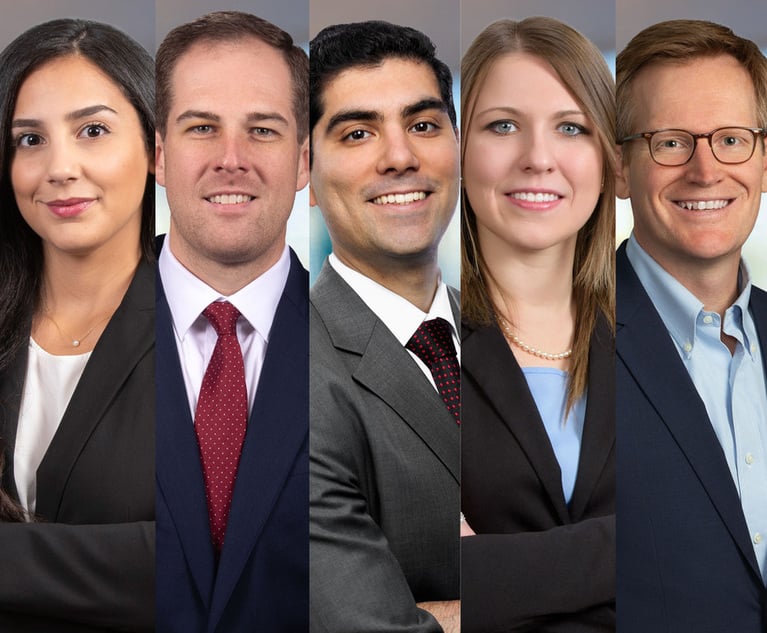'Feast or Famine': The Ups and Downs of Leaving Big Law to Go Solo
From less hassles to more flexibility, three attorneys describe their journey from Big Law to solo practice.
November 09, 2018 at 04:46 PM
4 minute read
 Emily Gianquinto, with EAG Law, and Ryan Suerth, Connecticut solo practitioner. Courtesy photos
Emily Gianquinto, with EAG Law, and Ryan Suerth, Connecticut solo practitioner. Courtesy photos
The bureaucratic red tape, the constant seeking of permission to speak to new clients and the ability to have more control over their own lives were the reasons several former Big Law attorneys left large law firms to start their own practice.
While the attorneys who spoke to the Connecticut Law Tribune said they enjoyed their time in Big Law and learned a lot, they also said the inflexibility of it all was the deciding factor in going solo.
“It just did not suit me. I was not very good at playing nicely with the structure of a large firm and all of the formality that goes along with it,” said West Hartford solo practitioner Richard Rochlin, who made the life-changing decision to fly solo in 2012.
Rochlin, who had worked in corporate finance for several firms, including Bingham, Dana & Gould, which had upward of 800 attorneys, and the powerhouse firm of Shipman & Goodwin, said being his own boss and not dealing with the corporate bureaucracy played a major role in him starting on his own.
“At the firms, you had to seek permission if you wanted new lines of business or new clients,” the 43-year-old Rochlin said this week. “You have to seek permission from the hierarchy about the scope of it, whether the firm may have represented them in the past, and you have to talk to a variety of people before you ever reach out to set up a lunch with a prospective client. That was difficult for me.”
Rochlin, who works with an associate, added: “It's just exhausting to have to deal with all the other issues when you just want to meet with this person and bring the business in. It's also exhausting navigating the egos of those in the big law firm before you ever make that first phone call.”
Emily Gianquinto, who worked for three law firms with 50 lawyers to more than 1,000 attorneys worldwide, echoed Rochlin.
“With any big firm you have bureaucracy,” said Gianquinto, a Glastonbury-based solo for about three years. “Big firms are, by nature, not as flexible as small firms or … solos.”
'Cash-Flow Roller Coaster'
Gianquinto, whose focus now is on business litigation, contract disputes and employment law, said going solo isn't easy.
“It was actually terrifying for a while,” Gianquinto said. “The biggest unknown was the pay,” she said.
“You have the security of a regular paycheck at the big law firms and you got benefits,” she said. “You also had staff supporting you. I still have no staff.”
Paying the bills was always in the back of his mind, Rochlin said.
“Starting out, it's a cash-flow roller coaster,” he said. “It is sometimes feast or famine. It takes a few years to stabilize that. At Big Law, everything is done for you. You have your secretary, you have a billing department and you have people who manage the file room.” There is a tendency early on as a solo to do everything quickly, said Rochlin, whose practice is now about 90 percent divorces.
“You can be costing yourself money spending time on administrative stuff rather than being a lawyer,” he said. Down the road, he said, “I'd like to have a few more associates to handle the day-to-day mundane tasks associated with divorce and I'd like more time to strategize, go to court, try cases and solve problems.”
All of those who spoke to the Connecticut Law Tribune said having more control over their work life was a huge plus.
“Part of what I love about being [a] solo is I get to control my own schedule,” Gianquinto said. “If I want to take a half day off and spend time with the kids or work until 2 p.m., there is not a partner who is upset with me. I make my own hours. I am working more hours, but I make my own schedule.”
Hartford solo practitioner Ryan Suerth said he has a great relationship with his former colleagues at Murtha Cullina, but added, “The advantage of being on my own allows me to again really just focus almost completely on the individual client. At a larger practice, there are added responsibilities of being a partner that go along with the job. It's a trade-off.”
This content has been archived. It is available through our partners, LexisNexis® and Bloomberg Law.
To view this content, please continue to their sites.
Not a Lexis Subscriber?
Subscribe Now
Not a Bloomberg Law Subscriber?
Subscribe Now
NOT FOR REPRINT
© 2025 ALM Global, LLC, All Rights Reserved. Request academic re-use from www.copyright.com. All other uses, submit a request to [email protected]. For more information visit Asset & Logo Licensing.
You Might Like
View All
K&L Gates Files String of Suits Against Electronics Manufacturer's Competitors, Brightness Misrepresentations
3 minute read
Eleven Attorneys General Say No to 'Unconstitutional' Hijacking of State, Local Law Enforcement
3 minute read
'Battle of the Experts': Bridgeport Jury Awards Defense Verdict to Stamford Hospital
3 minute readTrending Stories
- 1No Two Wildfires Alike: Lawyers Take Different Legal Strategies in California
- 2Poop-Themed Dog Toy OK as Parody, but Still Tarnished Jack Daniel’s Brand, Court Says
- 3Meet the New President of NY's Association of Trial Court Jurists
- 4Lawyers' Phones Are Ringing: What Should Employers Do If ICE Raids Their Business?
- 5Freshfields Hires Ex-SEC Corporate Finance Director in Silicon Valley
Who Got The Work
J. Brugh Lower of Gibbons has entered an appearance for industrial equipment supplier Devco Corporation in a pending trademark infringement lawsuit. The suit, accusing the defendant of selling knock-off Graco products, was filed Dec. 18 in New Jersey District Court by Rivkin Radler on behalf of Graco Inc. and Graco Minnesota. The case, assigned to U.S. District Judge Zahid N. Quraishi, is 3:24-cv-11294, Graco Inc. et al v. Devco Corporation.
Who Got The Work
Rebecca Maller-Stein and Kent A. Yalowitz of Arnold & Porter Kaye Scholer have entered their appearances for Hanaco Venture Capital and its executives, Lior Prosor and David Frankel, in a pending securities lawsuit. The action, filed on Dec. 24 in New York Southern District Court by Zell, Aron & Co. on behalf of Goldeneye Advisors, accuses the defendants of negligently and fraudulently managing the plaintiff's $1 million investment. The case, assigned to U.S. District Judge Vernon S. Broderick, is 1:24-cv-09918, Goldeneye Advisors, LLC v. Hanaco Venture Capital, Ltd. et al.
Who Got The Work
Attorneys from A&O Shearman has stepped in as defense counsel for Toronto-Dominion Bank and other defendants in a pending securities class action. The suit, filed Dec. 11 in New York Southern District Court by Bleichmar Fonti & Auld, accuses the defendants of concealing the bank's 'pervasive' deficiencies in regards to its compliance with the Bank Secrecy Act and the quality of its anti-money laundering controls. The case, assigned to U.S. District Judge Arun Subramanian, is 1:24-cv-09445, Gonzalez v. The Toronto-Dominion Bank et al.
Who Got The Work
Crown Castle International, a Pennsylvania company providing shared communications infrastructure, has turned to Luke D. Wolf of Gordon Rees Scully Mansukhani to fend off a pending breach-of-contract lawsuit. The court action, filed Nov. 25 in Michigan Eastern District Court by Hooper Hathaway PC on behalf of The Town Residences LLC, accuses Crown Castle of failing to transfer approximately $30,000 in utility payments from T-Mobile in breach of a roof-top lease and assignment agreement. The case, assigned to U.S. District Judge Susan K. Declercq, is 2:24-cv-13131, The Town Residences LLC v. T-Mobile US, Inc. et al.
Who Got The Work
Wilfred P. Coronato and Daniel M. Schwartz of McCarter & English have stepped in as defense counsel to Electrolux Home Products Inc. in a pending product liability lawsuit. The court action, filed Nov. 26 in New York Eastern District Court by Poulos Lopiccolo PC and Nagel Rice LLP on behalf of David Stern, alleges that the defendant's refrigerators’ drawers and shelving repeatedly break and fall apart within months after purchase. The case, assigned to U.S. District Judge Joan M. Azrack, is 2:24-cv-08204, Stern v. Electrolux Home Products, Inc.
Featured Firms
Law Offices of Gary Martin Hays & Associates, P.C.
(470) 294-1674
Law Offices of Mark E. Salomone
(857) 444-6468
Smith & Hassler
(713) 739-1250











